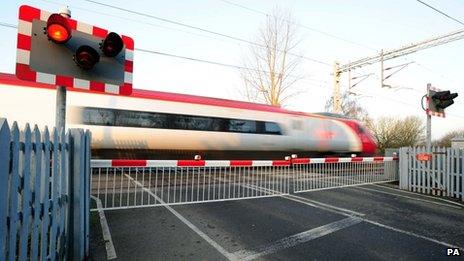Network Rail told by regulator to cut costs by £2bn
- Published
- comments

The rail regulator has approved funding to upgrade and close some level crossings
Network Rail has been told by the rail regulator that it must find savings of £2bn over the next five years at the same time as improving punctuality.
But the Office of Rail Regulation (ORR) said the cost cuts must not come at the expense of safety.
It said at least nine out of 10 trains must run on time on all routes by 2019.
Network Rail, which is in charge of the UK's rail infrastructure, welcomed the plans and said it would respond in September after analysing the findings.
Last week the ORR said Network Rail had missed all of its punctuality targets for England and Wales last year. The figures came a day after it was revealed that the company's net debt had reached more than £30bn.
Strike threat
The independent regulator set out its plans for 2014-19 after examining Network Rail's five-year business strategy, which was published in January., external
During the 2014-2019 period, the ORR said Network Rail must:
Improve punctuality - an average of 92.5% of trains on all routes across the UK must arrive on time, compared with its target of just over 90% now
Complete projects to increase capacity and improve service as fast as possible
Give more say to rail users on how the railway is improved, putting passengers "at the heart of decisions"
Provide better and more up-to-date data on the condition of its tracks, bridges and other assets, so problems can be fixed before they occur
Improve safety for passengers and workers - the ORR has approved £67m of funding to upgrade and close level crossings in England and Wales
Give greater value for money - the ORR is encouraging train operators, Network Rail and the supply chain to make further savings
The ORR said its assessment showed that between next year and 2019, the cost of running the rail network should be £21.4bn - nearly £2bn lower than proposed by Network Rail.
The savings will be made through new technologies, improved management and more efficient ways of working but will not come at the expense of safety, the ORR said.
Anthony Smith from Passenger Focus says passengers want "more trains, longer trains, more seats"
It added that it had approved a £12bn plan to enhance capacity to deal with the 14% anticipated increase in passengers by 2019.
Anna Walker, chairwoman of the ORR board, said regulators believed Network Rail could "do what it is promising to do for less money and more efficiently".
But Bob Crow, general secretary of the Rail, Maritime and Transport workers' union, said it would mean "massive cuts to renewals and maintenance, compromising safety and leading to more breakdowns, failures and delays".
He warned that any threat of compulsory job losses at Network Rail would lead to preparations for a national strike ballot.
Anthony Smith, chief executive of Passenger Focus, said the group was looking at the detail to see if the balance between cost cutting and efficiency was "about right".
"Passengers will judge it when the trains turn up on time," he told BBC Radio 4's Today Programme.
Mr Smith said: "We've had year after year of above-inflation fare rises that have led to money pouring into the rail industry and, in return for that, passengers expect the basics of the service - on time, clean train and more seats."
Facing fine
ORR chief executive Richard Price said the "industry must continue to improve its efficiency to reduce its dependence on public subsidy".
Anna Walker from the rail regulator: "We must have the improvements... but it must be done more efficiently."
A Network Rail spokesman said high levels of investment were needed to continue expanding the railways.
"Getting the balance right in making the choices between performance, growth and value for money is critical if we are to build on efficiency savings of around 40% achieved over the last two control periods," he said.
Michael Roberts, chief executive of the Association of Train Operating Companies, said the ORR plans were "an important opportunity to incentivise Network Rail and operators to work more effectively together".
A train is defined as on time if it arrives at the destination within five minutes of the planned arrival time for London and south-east England, or regional services, or 10 minutes or less for long distance services.
If Network Rail keeps missing punctuality targets, it faces a fine of up to £75m from the ORR.
The company is held responsible for delays caused by signal failures or relating to problems with train tracks.
- Published7 June 2013
- Published6 June 2013
- Published29 May 2013
- Published8 May 2013
- Published22 January 2013